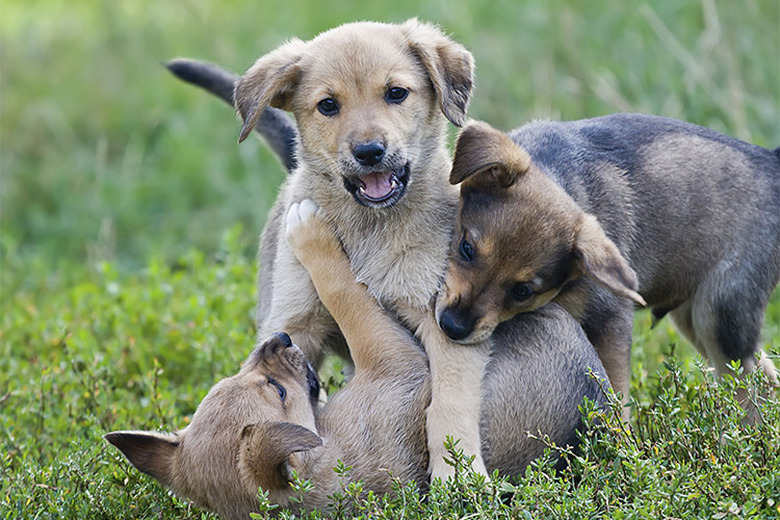If A Puppy Has Parvo Does Its Siblings Have It Too?
If your puppy comes down with the highly contagious canine parvovirus, the two of you must fight to save her life. While you should certainly notify the owners of your dog's siblings and mother, it's possible those dogs will not come down with the disease. Your puppy's best chance for survival means spending time in a veterinary hospital, receiving supportive care.
Parvovirus
Spread by contact with infected canines or their feces, parvovirus often kills within two days of a puppy exhibiting clinical signs. It's also hard to eradicate once it's in the environment. Puppies diagnosed or exposed to parvovirus should be isolated from other animals. Puppies under the age of 16 weeks are at special risk, even if they have received part of the parvo vaccination series. Puppies do receive some protection from antibodies present in their vaccinated mother's milk, but because of varying levels of maternal antibodies, it's not unusual for only some puppies in a litter to develop the disease. Besides antibody levels and vaccination status, infection risk also hinges on environmental cleanliness and the amount of exposure a puppy has to an infected sibling.
Symptoms
Parvo isn't subtle — it quickly becomes obvious you have a very sick puppy on your hands. The virus attacks the gastrointestinal system, so symptoms include bloody diarrhea and frequent vomiting. Get your puppy to an emergency vet as soon as possible.
At-Risk Breeds
While any dog or puppy can develop parvo, certain breeds appear to be at higher risk of contracting it than others. These include the Doberman pinscher, German shepherd and the rottweiler — so-called black and tan breeds — along with the Labrador retriever, English springer spaniel, Siberian husky and American Staffordshire terrier.
Treatment
According to the website PetMD, approximately 70 percent of dogs can survive parvo if hospitalized for treatment. Your puppy might require a stay of a week or longer — and that's a big expense. Her survival chances drop considerably if you attempt to give her supportive care at home. Puppies combating parvo require intravenous fluid therapy; antibiotics to fight intestinal bacterial infection, resulting from parvo-related ulceration; plasma transfusions; shots for nausea control and other possible medications. Constant monitoring and testing is also necessary to aid in your puppy's survival.
Vaccination
Other members of your puppy's litter might escape parvovirus if they've already received initial vaccinations against the disease. Considered a core puppy vaccine, the first shot is usually given between the ages of 6 and 8 weeks, with boosters every four weeks until the puppy is 16 to 20 weeks old. She'll get another booster a year later.
By Jane Meggitt
References
ASPCA: Parvovirus
American Veterinary Medical Association: Canine Parvovirus
Koret Shelter Medicine Program: Canine — Parvovirus (CPV)
VeterinaryPartner.com: 5 Parvo — The Physical Illness and its Treatment
PetMD: Canine Parvovirus Infection in Dogs
About the Author
Jane Meggitt has been a writer for more than 20 years. In addition to reporting for a major newspaper chain, she has been published in "Horse News," "Suburban Classic," "Hoof Beats," "Equine Journal" and other publications. She has a Bachelor of Arts in English from New York University and an Associate of Arts from the American Academy of Dramatics Arts, New York City.
